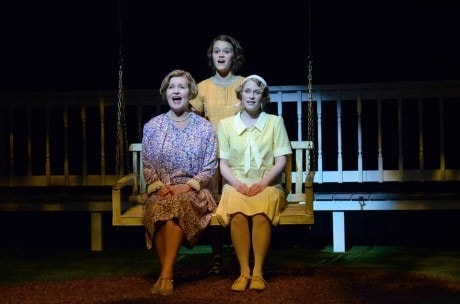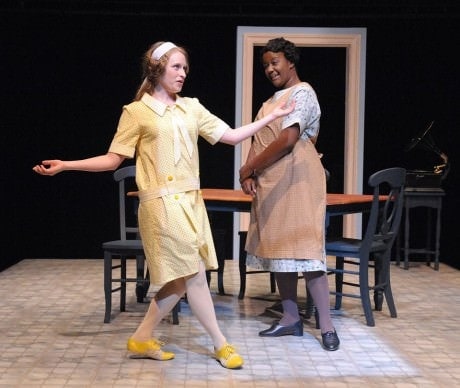In Rep Stage’s first show of its 21st season, the setting is Late Spring, 1925. The journey to a small, nondescript Texas town unexpectedly seduces audiences with the compelling people of Harrison, TX, including a lively fifteen-year-old, young lady of property.
A Young Lady of Property opens with three southern accented females singing an Acapella tune of remembrance, as they sway together on a long porch swing on the left side of a divided, cleverly crafted, two scene set. We are quickly introduced to the intriguing characters: Wilma Thompson (Christine Demuth), a young lady of property, her devoted best friend Arabella (Kathryn Zoerb), and Wilma’s guardian aunt, Gertrude or “Ms. Gert” (Yvonne Erickson), as she’s affectionately called. The verisimilitude of the performances and the pure simplicity of the characters in this Horton Foote’s little jewel of a play are the qualities I enjoyed most about A Young Lady of Property. A moving play about the broken dreams of the ordinary, common folk that are relatable and familiar, this Rep Stage production is a lovely, high-quality escape to the spoken and unspoken memories of friendship, love, and loss. Former Rep Stage Producing Artistic Director, Michael Stebbins, returns to direct.

Circumstances have rearranged Wilma’s ideal family and her home. For years, Wilma’s greatest wish is to share with her father the house that her mother left to her. Her mother is dead, and she has lived with her aunt ever since. Her father (Tony Tsendeas) is going to be remarried to Sibyl Leighton (Marianne Angella), a woman the town disapproves, and Wilma struggles to find her purpose in life. In the absence of a real family and an unreliable father, the house that Wilma once lived in has become her identity. The house “looks lonesome,” she says in a moment of introspection – mirroring the isolation and loneliness she feels since the death of her beloved mother. The house “is all in this world that belongs to me,” she confesses when she realizes that her father wants to sell the house before he remarries.
As Wilma begins to talk big about living in the house by herself, she soon realizes that what she really wants most is to be married with children and playing croquet in her home’s backyard. Searching for the definition of home and her place in this world, Wilma attempts to replace haunting memories of the past with the one possession she owns, and in an act of desperation discovers rescue and enlightenment from an unexpected source.
To say that this play has an old fashion, Hallmark Theatre quality about the realism expressed on stage is a true compliment and a rare find in the theater these days. There is nothing tired, artificial, or saccharine about this classic theater. On the contrary, it was refreshing to spend the near 90 minutes whisked away in this time piece of nostalgic recollections of the “better days” of the past – a time when life is remembered for a simplicity and slower pace, in spite of all of the surrounding drama. Themes of time and memory accentuate the brilliance of Horton Foote’s writing, and it is the complexity and insight into this family drama that quietly demonstrates, with gentle doses of humor, the turbulent realism that exists with every generation.
Horton Foote originally wrote A Young Lady of Property in 1953 as one of his early Golden Age of Television tele-plays for Philco Goodyear Television. Although it was never produced on Broadway, it is considered a staple in Foote’s canon of plays. His career is recognized as one of America’s most successful and honored dramatists for cinema, television, and theater. The Pulitzer Prize winning American playwright for Drama in 1995 for his play The Young Man From Atlanta (He was nearly 80 when he won.), Foote also was the winner of two Best Writing Academy Awards for the screenplays To Kill a Mockingbird (1962) and Tender Mercies (1983). In 1985, he garnered an Academy Award nomination for A Trip to Bountiful, a play in which Cecily Tyson won a Best Actress Tony Award this year for her performance in the lead role in the critically acclaimed revival.
Michael Stebbins’ direction choice of using the stark, isolated audience address of the characters speaking directly to the audience at times (and other times not) was initially emotionally jarring to me. I relish the emotional energy that is exchanged when actors are looking deep into each other eyes, feeding off the chemistry of the moment. But it doesn’t take long to realize the cleverness of this stylish technique that deftly highlights the mastery of Foote’s writing and language flair, creating moments for the different characters to drawn your focus and capture your heart. Stebbins’ direction finesses a tenderness and a genteel calmness in the midst of this family melodrama. It is an emotional journey that sneaks up on you and effectively engages your attention, and the smart direction weaves the audience and the production into a highly watchable, evenly paced, and alluring theater piece.
Stebbins reunites with three members of the Mary Rose cast he directed last season: Marilyn Bennett (Miss Martha Davenport), and Tony Tsendeas (Russell Walter/Lester Thompson/Man), as well as Christine Demuth, the lead in both productions. Marianne Angella, Yvonne Erickson, Erica Lauren McLaughlin (Minna), and Kathryn Zoerb showcase a fine ensemble that listens to and communicates with each other very well. That type of chemistry and cooperation is essential for a play such as this where there are few props and big scenes to hide behind. Their openness to listen and react with truth and authenticity is everything in making The Young Lady of Property a highly recommended production.
Christine Demuth, as Wilma, paints a vivid portrait to the angst and loneliness of a young girl who desperately misses her mother who “died of a broken heart,” and yet as the years pass she has forgotten the look of her mother’s face – only to be reminded by looking at a photograph found in a dresser drawer. Demuth’s charm in this role is not only in her believability to play a young girl – a quality that she’s got down to a science (She played the adolescent lead in Mary Rose last season) – she makes you care about her without the flash of dramatic antics. Reminding you of your family and friends (faults and all) is where Demuth excels as Wilma, gently capturing the knowing authority of a teenager at a crossroads.
The relaxed southern style of Yvonne Erickson as “Ms. Gert” is a comforting joy to watch on stage. Gertrude, (Wilma’s father’s sister) has a grace and dignity that are all her own. A woman of substance with a spitfire spirit, “Ms. Gert” serves as Wilma’s emotional anchor. With her backbone of good sense and self-determination, Gertrude helps the fifteen-year-old navigate her way through the delicate ups and down of being a motherless teenager. Erickson is striking as Gertrude, and I cannot help notice the uncanny physical similarity and on stage presence she reminds one of Joanne Woodward with her fine-tuned portrayal in this role.
Kathryn Zoerb makes her Rep Stage performance stealing debut as Wilma’s loyal and devoted friend Arabella Cookenboo. Arabella possesses a wholesome, girl next-door authenticity that reminds one of the best friend growing up you always imagined having. It’s the surrender of choreographed mannerisms and the often relied upon tricks in her honest characterization that makes the role of Arabella fascinating and Zoerb’s portrayal so enjoyable.

Minna (Erica Lauren McLaughlin), is a domestic who is treated as a valued and respected member of the family serves as a listening ear for Wilma, and a go- between her and the adults. What is refreshing in this often seen character role is to witness how Wilma and Minna speak with one another. If Aunt Gert plays the surrogate mother in Wilma’s life then it is Wilma who earns the role of the adult confidant. A dynamic where Minna treats Wilma with maturity without talking down to her, and in turn Wilma talks to her as a trusted friend.
Marilyn Bennett as Miss Martha doesn’t disappoint as the postal worker, full of personality and snooping interest providing moments of humor, and Tony Tsendeas finely completes the cast as the three male characters in the production including Wilma’s father.
Greggory Schraven’s Scenic design is clean, simple, and spacious – and having the hanging frame centerpiece used for the Post Office scenes is a clever twist. The decision to stage the production with an individual outdoor set and an indoor set divided and built on top of a larger outer stage, was a genius stroke to keep the story and pace moving because the characters are seen transitioning between the two spaces with ease. The sound design of Ann Warren goes the extra mile with the fluttering ambient sounds of rubbing crickets, and the multiple varieties of mockingbirds sounds. Also, the left to right wrap around sound of the moving train in one scene was an aural delight. Costume Designer Kristina Lamdin’s choice of stylish hats, and the soft pastel and tan hues of the wardrobe and flattering long waisted dresses were spot-on roaring twenties period appropriate of the everyday fashion.
Have you ever found yourself so engrossed at the end of a theater production that you unconsciously release a soft “hmm”at the conclusion? A Young Lady of Property was one of those moments for me. That surprising “hmm” released from my lips signaled to me that this play was not only a relaxing and engaging, good time spent, but was the disappointment indicator that the lull of the evenings’ ‘escapism’ was over, and the fast pace juggle of my daily realism had returned.
Running Time: One hour and 25 minutes, with no intermission.
A Young Lady of Property plays through September 29th, 2013, at Rep Stage at Howard Community College’s Horowitz Visual and Performing Arts Center’s Studio Theatre – 10901 Little Patuxent Parkway, in Columbia, MD. For tickets, call the box office (443) 518-1500, or purchase them online.
*PLEASE NOTE: There is no evening performance on Sunday September 29, 2013





